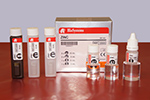Zinc reagent
The determination of Zinc in seminal plasma, together with the reagent for Citrate and Fructose complete the Biosystems line for the diagnostic evaluation of human fertility. Zinc is used as a marker of the secretory function of the prostate gland. Low values indicate an abnormal disruption of the secretory function, possibly as a result of obstruction of the conducts due to acute or chronic inflammation. The determination of zinc in serum provides information about the metabolism of proteins and nucleic acids, and the functioning of the immune system, which is required for wound healing. A severe blood zinc deficiency is linked with depressed growth and stunting and increases the incidence of infectious diseases. Less severe zinc deficiencies are linked with immune function disorder, diarrhea, altered cognition, alopecia, vision defects and other adverse clinical conditions. Ingestion of a zinc-contaminated diet involves high blood concentrations and is associated with abdominal pain, diarrhea and nausea. Heparinized plasma samples are preferred to serum for zinc analysis to avoid possible zinc contamination from erythrocytes, platelets and leukocytes during clotting and centrifugation.
Supplier: BioSystems
Website:



